Comprehensively Strengthening Party Discipline
By staff reporter LU RUCAI
THE development of a society relies on the sound operation of the ruling party. The CPC’s actions in building a well-disciplined party are beneficial to China’s further development. “It’s a practice we, the Mexican Embassy in Beijing, should learn from,” Enrique Escorza, a minister at the Mexican Embassy in Beijing, said at an event last June organized by the International Department of the CPC Central Committee (IDCPC).
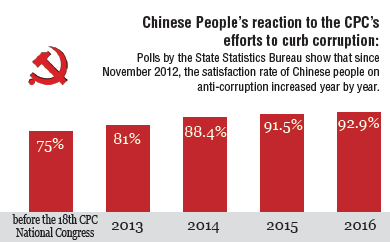
Political party leaders from Sri Lanka, South Africa, and Mexico, foreign diplomats in China, a group of China study researchers, and representatives from related institutions attended the event, which was themed on the CPC’s efforts to build a well-disciplined party in all aspects. Members of the CPC Shanxi Provincial Committee briefed all present on Chinese President Xi Jinping’s new concepts and strategies regarding state governance, and Shanxi’s effective measures to enhance Party discipline.
In recent years, China’s ruling party, whose membership exceeds 88 million, and its system of cadre selection and promotion, as well its anti-corruption drives, has provided political parties in other countries with valuable guidance and propelled their growing exchanges.
Cadre Selection
The Organization Department of the CPC Jinzhong Municipal Committee in central Shanxi presented at the event a simulation of the process of selecting a county magistrate. An enterprising spirit is the most sought-after quality in candidates, Jinzhong Party Secretary Hu Yuting said. All newly appointed officials are required to sign an undertaking to achieve specific goals during their tenures and accept public oversight. Jinzhong selected six county leaders out of 118 candidates last year, which signifies that only those possessing the required attributes are appointed to leading positions.
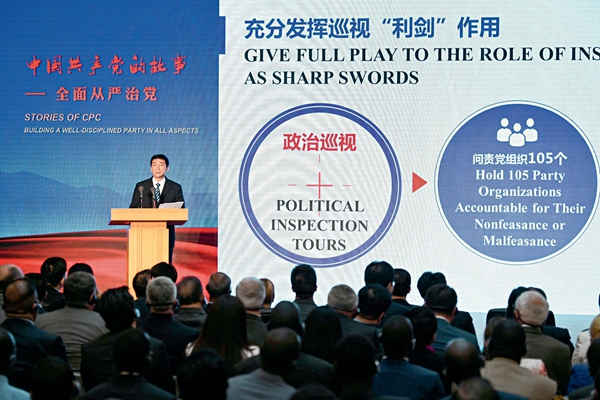
The practice in Shanxi epitomizes the CPC’s personnel system, which encompasses the selection, appointment and training of officials, and inter-departmental exchanges. Former General Secretary of the CPC Central Committee Hu Jintao said in his report to the 18th National Congress of the CPC: “We should appoint officials on the strength of their merits regardless of their origins, select officials on the basis of their moral integrity and professional competence, giving priority to the former, and promote only outstanding officials who enjoy popular support.”
The report underlined the importance of upholding the people’s right to be informed about, participate in, express views on, and oversee the procedure of cadre selection. In pursuing this goal, the CPC has constantly improved the democratic recommendations and evaluations relevant to nominating potential holders of office, and promoted transparency in the selection and promotion of officials. The Party has also adopted a holistic approach to the selection of candidates by taking into consideration both the amount of votes they receive and public opinion.
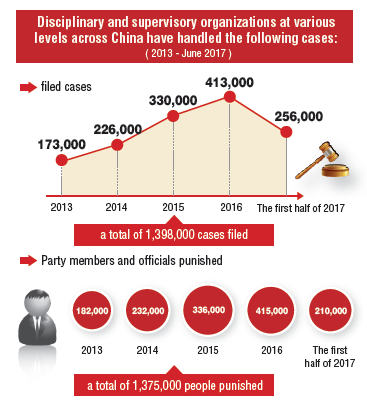
The report also undertook full and strict implementation of the principle of selecting officials in a democratic, open, competitive, and merit-based way. Since 2008, the Organization Department of the CPC Central Committee and 31 provincial level regions across the country have established the 12380 hotline, on which citizens can report any malpractices they observe in the selection of officials.
One Indian researcher at the event raised the question, “What’s the difference between the CPC’s system of appointing officials and that of elections in Western countries?”
Sun Dajun, executive deputy chief of the Organization Department of CPC Shanxi Provincial Committee, replied that the Chinese system is an effective way of finding people that meet the Party committee’s expectations, featuring high efficiency and low cost. He added that it is a flexible approach to addressing any errors that may occur, as officials whose performance of their duties is deemed unsatisfactory may be removed from office before their terms expire.
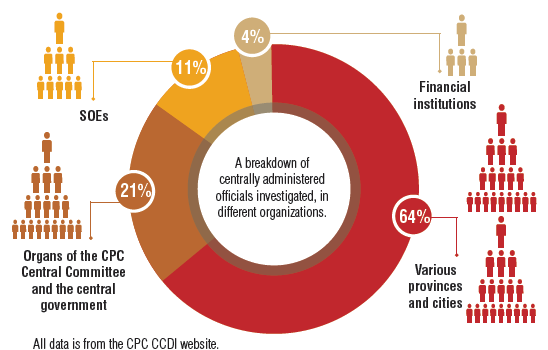
Daniel Bell, a China study expert from Canada, thought highly of the CPC system of cadre selection. He agrees with the rigorous evaluations of officials whereby only the most outstanding are promoted, and commends the Chinese practice of encouraging officials to accrue knowledge towards better performance of their duties rather than squandering time and funds on campaigning for votes.
Sharing Experience
Fully strengthening Party discipline is a key component of President Xi’s thoughts on state governance, and has polarized world attention. Song Tao, head of the International Department of the CPC Central Committee, observed that the leaders of many foreign political parties are eager to emulate the CPC’s remarkable progress in strengthening its self-governance within a short time frame. He attributed these achievements to the Party’s explorations and innovations over the past four years which embody its resolve and wisdom.
Song raised the example of the Party’s top-down drive to eradicate formalism, bureaucratism, hedonism, and extravagance, which was launched by the Political Bureau of the CPC Central Committee. Meanwhile, the Party has escalated its efforts to root out corruption by cracking down on both “tigers” – senior officials, and “flies” – lowly bureaucrats. It has also promulgated a slew of Party regulations on members’ participation in Party activities and intra-Party supervision and self-discipline.
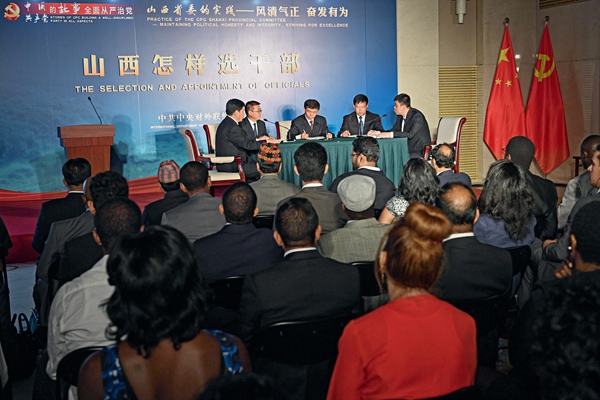
A simulation of the selection of officials in Shanxi Province.
To ensure their implementation, the Party has reformed its inspection practices, and established a system of checks and balances that combines intra-Party, democratic, public, and media supervision. Equal emphasis is placed on the education and guidance of Party members and officials in efforts to foster an ethical, highly principled political environment.
“In a globalized world, no country or political party can exist on its own. The fight against corruption calls for global efforts,” Song Tao said. “China places great emphasis on and has actively promoted international anti-corruption cooperation under the frameworks of the UN, G20, APEC, and BRICS, as well as on bilateral levels with relevant countries. The CPC pays great attention to exchanges with other countries’ political parties which provide the opportunity to compare notes on self-governance. It thus contributes its experience and proposals to the development of political parties worldwide and better global governance.”
So far, China has joined 15 international and regional anti-corruption cooperative mechanisms. It works tirelessly towards implementing the United Nations Convention against Corruption, and has served as rotating president of the anti-graft arms of APEC and the G20. The country’s efforts brought about the adoption by the 2014 APEC Ministerial Meeting of the Beijing Declaration on Fighting Corruption, and the 2016 G20 Summit’s endorsement of the G20 High Level Principles on Cooperation on Persons Sought for Corruption and Asset Recovery and the 2017-2018 G20 Anti-Corruption Action Plan. Last year, China also established a research center on international cooperation regarding persons sought for corruption and asset recovery in G20 member states.
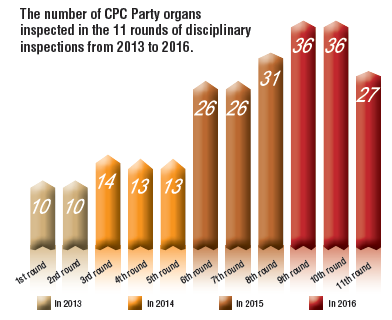
By November 2016, China had established anti-corruption cooperation partnerships with 89 countries and regions worldwide, and signed 48 extradition treaties and 59 agreements on mutual legal assistance in criminal matters.
Since the establishment in June 2014 of the Fugitive Repatriation and Asset Recovery Office of the Central Anti-Corruption Coordination Group, 3,051 suspects have been repatriated from 90-plus countries and regions; among them, 541 were CPC members and government workers. RMB 9.1 billion worth of ill-gotten gains have also been recovered.
“When it comes to fighting corruption, China sets an example to the rest of the world, especially for developing countries. We hope to learn from the Chinese experience in this regard,” said Sabelo Mgotywa of the South African Communist Party.
The experience of the CPC Shanxi Provincial Committee epitomizes that of the Party throughout the country. This province so rich in cultural and natural resources was, for a time, plagued with political corruption that sapped the local economy. Over the past three years the province has taken painful, drastic measures to fight corruption, according to Party Secretary of Shanxi Luo Huining. During the 12 months from mid-2016 to mid-2017, CPC members in official positions that received punishment grew 8.6 percent, year on year. A total of 105 CPC groups were penalized for lax management of their members, and 1,025 Party members in leadership positions were held accountable. During the 2016 re-election of provincial, prefectural, county, and township officials, the CPC provincial committee explicitly declared that only honest and capable candidates would be considered for government posts. According to this principle, it weeded out 449 of those in the running.
From November 2012 until the end of 2016, the CPC Central Commission for Disciplinary Inspection investigated 240 officials nationwide and punished 223 centrally administered officials who were originally appointed by the CPC Central Committee. Discipline inspection and supervisory organs at various levels also filed 1.162 million cases, and punished 1.199 million Party members and officials.
“Instill in all officials the awareness that they are under an obligation to perform their duties diligently and competently, and to hold accountable those who fail to do so.” This is the rule that the CPC Shanxi Provincial Committee, and also the CPC in general, follows in filling its leadership positions. In this way, a cohort of cadres that maintain close contact with the people, devote themselves to public service, and who are innovative and enterprising are selected and promoted.
Clean Politics Conducive to Strong Economy
Luo Huining sees a healthy political environment as a precondition for economic development. “Shanxi is fostering a business-friendly environment through nine special programs that aim to shorten review and approval procedures, streamline the administrative process, optimize relevant systems, create flexible mechanisms, increase efficiency, and provide good services,” Luo said. Since the latter half of 2016, 14,000 local government officials and those of CPC organs have visited 4,580 corporations and helped them solve around 10,000 problems falling within the government ambit. This practice is expected to become the norm in Shanxi.
Liu Yanzhong, deputy secretary-general of Jinzhong municipal government, was paired with a private casting company in Taigu County that produces malleable steel pipes. After repeated visits and talks, he won the trust of its executives and revealed to them the problems that often crop up in family businesses, like sub-standard management and narrow vision. By visiting every section, workshop, and work team of the company, Liu and his colleagues enabled it to impose higher standards and build its brand, thus bringing the company tangible benefits.
During his recent trip to Shanxi, Kabir Hashi, general secretary of the United National Party of Sri Lanka, was impressed by the program of sending government officials to local businesses. “In certain countries many people are wrestling with poverty and inequality, and are disillusioned with political parties and organizations. But during my visit to China, especially to Shanxi, I witnessed how the CPC’s reforms under the leadership of General Secretary Xi Jinping have met and overcome this challenge,” Kabir Hashi said.
Shanxi’s measures to build a clean and efficient party and government have promoted economic growth. In the first quarter of this year, the local GDP grew 6.1 percent over that of the same period of the previous year, the general public budget revenue rose by 12.6 percent, and the value added by strategic emerging industries increased 14.9 percent.
Talking about his first visit to Shanxi, Daniel Bell admitted that although he had believed beforehand that China’s anti-corruption campaign might be effective in alleviating corruption, he nevertheless thought it would be at the cost of reluctance on the part of officials to take risks or innovate for fear of making mistakes. However, his view changed after seeing the many highly competitive, enterprising officials in the region that had formerly been cowed by a polluted political environment. He also observed a pickup in GDP after a period that had previously experienced slow growth. This change, he said, could be attributed to the policies followed on selecting and promoting officials, as well as changes at the local leadership level.
“The more I learn about China’s organizational system, the more I appreciate it,” Bell concluded.
- “Mexico Knows That There’s a Growing Market in China” – Interview with Mexican Ambassador to China José Luis Bernal
- The Growth of China’s Military Strength and Its Contribution to World Peace
- Innovative Development: The New Power Behind a Revitalized Economy
- Better Environment, Better Livelihood
- Poverty Relief: Achievements in Five Years
Services
Economy
- BRICS: Stronger Partnerships for a Brighter Future – An Interview with South African Ambassador to China Dolana Msimang
- BRICS: Towards Multi-Polarity and Global Governance
- “BRICS Plus” and the Future of the “BRICS Agenda”
- Livable Smart City or Megacity Best Avoided? – Beijing’s Vision for a New Greater Capital Zone
- Supply-side Structural Reform: New Practice under the “New Normal”
